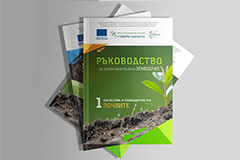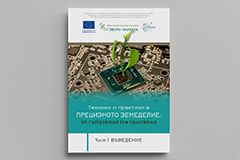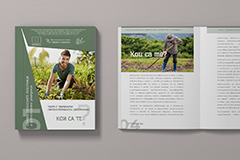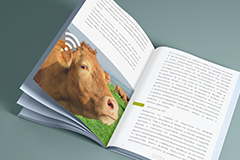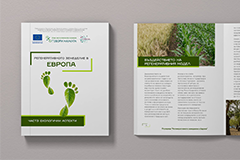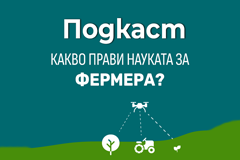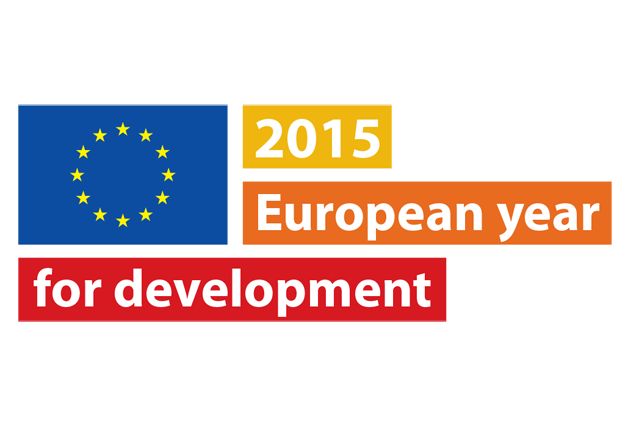Регенеративното, или наричано още консервационно земеделие, използва по-систематичен и цялостен подход към земята, която се обработва, и прилага в обработката принципи, осигуряващи повишена продуктивност и биоразнообразие в дългосрочен план. В основата му стои доброто състояние и функциониране на почвите. Доброто състояние на почвата зависи от органичната материя, която включва всякаква жива материя като корени на растения, червеи, микроби.
Вие сте тук
New Innovative Business Models in the Sphere of Agripreneurship

INTERVIEW WITH MR. TZOMAKAS
Head of Regional Development Fund of the Region of Western Greece
LP OF PROJECT AGROINNOECO
New Innovative Business Models in the Sphere of Agripreneurship
Interreg Balkan Mediterranean Programme 2014-2020
Mr. Tzomakas, what inspired you to write a project proposal in the field of the agripreneurship?
Well, the tool that I was searching for is called Interreg Balkan-Mediterranean Programme, a new cooperation tool which capitalizes on previous experience but provides more structured support for strengthening the cooperation in the areas of the Balkan Peninsula and the Eastern Mediterranean Sea. The Programme prioritizes on the socioeconomic development and demography, environment and climate change, natural and cultural heritage. Having in mind the economic disparities of the territories covered by the Programme and the lack of support for start-up businesses, me and my team decided on writing a project proposal which will develop a pre-incubation environment for young entrepreneurs and SMEs, giving them the opportunity to build specific entrepreneurial skills for running up a business. We focused on the agrifood, a major driver for enhancing the competitiveness of the entrepreneurs and SMES in the Balkan and Mediterranean Region.
Could you describe in brief the partners involved in this project?Is the cooperation successful?
Seven partners on a total scale are willing to improve the territorial competitiveness, while promoting and supporting the entrepreneurship, among them representatives of Business organizations: Bulgarian Chamber of Commerce and Industry (Bulgaria), Chamber of commerce and Industry of Tirana (Albania), Chamber of Achaia (Greece), University and Research Institutions: Cyprus University of Technology, Technological Educational Institute of Western Greece, University of Tirana (Albania) and the Local Government Institution where I work: Regional Development Fund of the Region of Western Greece. The project’s partnership is productive, every partner performs properly the tasks allocated.
Let’s move on to the essence. Can you tell us something about the overall and specific objectives of the project?
The overall objective of the project is to improve the innovation capacity of the business sector and to develop an appropriate environment for potential entrepreneurs that have feasible business ideas and are willing to turn them into real business plans by obtaining specific knowledge on specific pilot trainings intended for that purpose.
The specific objective that the project follows is to provide adequate support to SMEs/entrepreneurs by:
- encouraging business model innovation;
- motivating enterprises to develop and promote innovative products/services;
- promoting networking and clustering support by creating pre-incubation environment;
- facilitating the innovation transfer to the sector;
- internalization of the newly generated business ideas in the sphere of the agripreneurship;
- assisting in increasing the number of business companies in the BM regions.
OK and now the most interesting part - the “Innovation Contest in the Agri-Food sector”. How did it happen and what results were achieved?
The contest was held simultaneously in all 4 regions participating in the AGROINNOECO project, namely Albania, Bulgaria, Cyprus and Greece.The invitation was addressed to both existing and potential food business operators. The main goal of the contest was every region to choose 15 innovative ideas of young and existing entrepreneurs. Proposals were submitted electronically via the project website. They were evaluated on the basis of five evaluation criteria, which were as follows: (Applicability of the idea to the reference area; The degree of integration of the idea into the agri-food sector; The abilities of the individuals involved; The level of innovation of the idea and Verification of the problem and its solution (feasibility and viability of the idea). The 15 best proposals selected per country were supported through an interactive learning and training experience to develop a business plan based on their business idea. Accordingly, the training helped the chosen entrepreneurs to present their business plan at the upcoming technological and innovative exhibition Patras IQ, an event that brings annually together lots of interested parties. Simultaneously with that, there was an on-line educational training which was hosted by the Virtual Hub platform.
You mentioned the term Virtual Hub, what are the functionalities of this on-line platform?
The Virtual Hub is an online entrepreneurial educational program which has the nature of a pre-incubator for learning and development business plan environment, where the participants can complete courses by developing their own business idea and getting the support needed for doing it. The trainees in the platform can also fill in questionnaires after going through the educational programme and at the end they will receive “Entrepreneurship Certificates.”
Link to the Virtual Hub: http://virtualhub.agroinnoeco.eu/en_US/authentication/register
You mentioned that you and the project’s team, altogether with newly recruited entrepreneurs participated at the technological exhibition in Patras IQ 2019. What feedback did you receive from the entrepreneurs? Were they pleased with the format of the exhibition?
I will say a few words about the Technology Exhibition Patras IQ first. It was organized in the period 12-14 April 2019. It is an important event co-organized by the University of Patras, the Ministry of Education, Research & Religious Affairs, the Ministry of Economy and Development, the Chamber of Achaia, the Region of Western Greece, the Hellenic Open University and the Technological Educational Institute of Western Greece. The Technology Exhibition Patras IQ acts for a regional forum for innovative ideas and services, with the main goal of creating a competitive advantage in both the research and manufacturing sectors.
The AGROINNOECO project delegation consisted of around 70 people. Within the framework of this visit, pitching events and bilateral business forums were held respectively on the dates 13thand 14th of April 2019. Everybody is aware of the fact that pitchesnowadays are good option to communicate your business idea with potential investors and business angels. The exhibition also provided the opportunity to create useful contacts through networking events and other bilateral formats. Assuredly, the exhibition opened up newhorizons and possibilities for the visitors and opened their market ideas for competition. The entrepreneurs recruited through the AGROINNOECO project were favored by communicating with potential investors, by participating in networking events and other meetings. On the other hand, the delegation was complemented with different representatives of Agrifood associations from Albania, Bulgaria, Cyprus and Greece which exchanged experience and expertise in the sector. The associations also shared new technological and innovative methods that they use in their everyday practice. The exhibition was beneficial for everyonelooking for innovations and new technologies.
What next, tell us something about the final phase of the project?Do you plan to elaborate a document that will recommend new forms of agripreneusrhip? Or something similar?
Wе foresee the development of Marketing Plan for further exploitation of the Virtual Hub which will ensure the sustainability of the project and will introduce new innovative services and products in the agrifood sector. Part of that Marketing Plan will also be the follow-up and exploitation plan which will give recommendations for the establishment of Territorial Agroindustry Cluster in the framework of project AGROINNOECO.
Link to AGROINNOECO website: http://www.agroinnoeco.eu/
Link to AGROINNOECO facebook: https://www.facebook.com/BalkanAgroinnoeco/
Link to the AGROINNOECO promotional film:https://www.facebook.com/tsaltasd/videos/10157736053046102/?t=0
ОСП: Говори науката
Платени публикации
Международното общество за прецизно земеделие прие следната дефиниция за прецизно земеделие през 2019 г.: „Прецизно земеделие е управленска стратегия, която събира, обработва и анализира времеви, пространствени и индивидуални данни и ги съчетава с друга информация в подкрепа на управленски решения въз основа на изчисления на възможните промени. Резултатите са повишени ефикасност в употребата на ресурси, качество, продуктивност, доходност и устойчивост на селскостопанската продукция.“
Формите на трудова заетост в сектор селско стопанство са три: самонаети (фермерите), наети (наемните работници) и семейна работна ръка. Тази заетост често се определя от анализаторите като непълна, допълнителна и неформална. Според данните на Агростатистиката в българското селско стопанство преобладава дела на самонаетите и семейните работници, а наетите са около 10% от всички работещи в земеделието.
Интелигентните системи промениха изцяло традиционните методи на животновъдството като практика. Продуктивното и конкурентно животновъдство използва модерни технологии от рода на модели за машинно самообучение. Модерните технологии позволяват набиране на големи обеми от животновъдни данни, които могат да се използват за ежедневни морфологични, физиологични, фенологични и други свързани измервания.
Селското стопанство е най-голямата индустрия в света и има много значимо въздействие върху околната среда. Много от неговите дейности причиняват замърсяване и деградация на почвите, водите и въздуха. То обаче може да играе и положителна роля, например чрез улавянето на парникови газове в почви и култури или намаляването на риска от наводнения, когато се прилагат определени земеделски практики. С разширяване на обхвата на тези практики въздействието се подобрява, но остава още много път, който трябва да се извърви.
В подкаст "Какво прави науката за фермера?" можете да намерите информация по ключови теми в модерното селско стопанство, свързани с глобалните тенденции на развитие, политиката на ЕС в областта на земеделието и животновъдството и научните постижения, които променят облика на фермерската професия и на селските райони.

